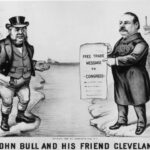It was a mild, crisp, and sunny Saturday afternoon, and the two doctors were on a mission. Flyers and stickers in hand, they made their way through the Columbus Square Park neighborhood of Kansas City, Missouri, which sits just blocks south of the winding and muddy Missouri River.
Iman Alsaden and Selina Sandoval, respectively the chief medical director and associate medical director of Planned Parenthood Great Plains, were among the 50 or so volunteers spread out across Kansas City on October 26 as part of a coordinated get-out-the-vote effort in support of the state’s proposed Amendment 3. The measure seeks to undo Missouri’s total abortion ban that took effect less than an hour after the U.S. Supreme Court issued its Dobbs v. Jackson Women’s Health Organization decision in June 2022. With just 10 days to go until Election Day, similar efforts were also underway in St. Louis and Columbia, home to the University of Missouri’s flagship campus.
Alsaden looked down at an app on her phone as the pair approached a tall brick home. A 56-year-old female voter named Mary lived there, according to the app, Alsaden reported, and she hadn’t yet voted. “Oh, I like this for us!” Sandoval said. Mary wasn’t home, and Sandoval slipped a flyer in support of the amendment on the doorknob.
Missouri is one of 10 states with abortion rights initiatives on the ballot this November. And, according to polls, support for Missouri’s amendment is strong: A September Emerson College Polling/The Hill survey of state voters, for example, revealed that 58 percent planned to vote for the measure.
The Yes on 3 campaign, backed by a coalition of groups under the banner Missourians for Constitutional Freedom, has been aggressive. The coalition has raised more than $30 million — far outpacing groups urging a “no” vote on the amendment. And while the campaign has received some large donations and in-kind support from individuals and organizations across the country, its campaign finance reports reflect that the effort has been fueled by thousands of small donations, a seeming testament to a vigorous text-messaging campaign. Its most recent quarterly finance report, for example, was nearly 1,700 pages long.
In contrast, groups advocating for keeping the ban in place — Vote No on 3 and Missouri Stands with Women — have struggled, despite the efforts of their political allies to keep the measure off the ballot, including a failed lawsuit to stop it. As of late October, those groups had raised about $2 million, which includes a more than $150,000 infusion of late cash from D. John Sauer, a former Missouri solicitor general and a member of Donald Trump’s legal team.
Photo: Jordan Smith/The Intercept
The energy of the campaign was palpable as Alsaden and Sandoval knocked on doors, even though there weren’t many voters home along their route. At one stop, Sandoval asked a man who opened the door whether he’d voted yet. “Yes,” he replied. “Did you vote ‘yes’ on Amendment 3 to get rid of the Missouri abortion ban?” she followed up. “Sure did!” he replied. “Ooh! Love it!” Sandoval said. “Wooo!” the man replied, taking a few stickers that signal support for the amendment.
The stakes couldn’t be more clear. If Yes on 3 can get voters to the polls, the campaign is likely to win — and Missouri would be the first state in the country to overturn a total abortion ban in the wake of Dobbs.
The Trigger Ban
The ink had not yet dried on the Supreme Court’s Dobbs decision on June 24, 2022, when Missouri’s then-attorney general, Eric Schmitt, hit send on a four-page opinion addressed to the state’s Revisor of Statutes. Schmitt, who is now a U.S. senator, confirmed that the court had shredded the constitutional protection for abortion, freeing Missouri to end legal abortion in the state. “This opinion immediately restores Missouri’s deeply rooted history and proud tradition of respecting, protecting, and promoting the life of the unborn,” Schmitt wrote.
In a subsequent press release, Schmitt crowed that the state would go down as the first to officially, fully strip millions of residents of their reproductive autonomy. “My Office has been fighting to uphold the sanctity of life since I became attorney general,” he said, “culminating in today’s momentous court ruling.”
Practically speaking, the right to abortion in the state was already thin. The increasingly conservative legislature had spent more than a decade stripping away reproductive rights. By the time lawmakers passed the trigger bill in 2019 that would allow Schmitt to decree abortion rights dead, the state had just one clinic, a Planned Parenthood in St. Louis, left to provide services.
Missouri’s strict laws had caused many residents to seek reproductive care in Illinois, as the number of abortions performed in Missouri drastically decreased from 6,163 in 2010 to just 150 in 2021. The state’s abortion ban, with limited exceptions, immediately caused issues such as a hospital system in Kansas City ceasing emergency contraceptives and a woman being denied an emergency abortion despite her dire circumstances.
The state’s amendment to protect abortion rights has sparked controversy within the reproductive justice movement. Critics argue that the protections outlined in the amendment, similar to Roe v. Wade, still allow government intrusion into individual rights, leaving room for lawmakers to undermine these protections. Some advocates believe a more expansive approach without government interference would have been more effective.
The amendment attempts to define fetal viability on a case-by-case basis, making it challenging for the legislature to unilaterally restrict abortions. If passed, advocates may need to take legal action to lift the current ban in Missouri, similar to the process in Ohio where a constitutional amendment was passed but legal challenges were required to overturn existing bans.
Overall, the fight for reproductive rights continues in Missouri, with potential legal battles ahead to address the various restrictions on abortion within the state.
“It will be disappointing that every single day, care is not restored,” shared Emily Wales, president and CEO of Planned Parenthood Great Plains, in an interview with the Kansas City Star. “Missourians’ lives are at risk, but we will be presenting our case to the courts who are tasked with making these decisions, and we will exhaust all efforts to expedite the restoration of access as soon as possible.”
On the other hand, lawmakers opposed to abortion have indicated their intent to challenge the extent of the amendment — and the voice of the voters — possibly by drafting a repeal measure to be included on a future election ballot. “This is not the final decision,” stated the strongly anti-abortion Republican state Sen. Mary Elizabeth Coleman in an interview with the Missouri Independent. Coleman had previously pushed for a state law prohibiting individuals from seeking abortion care out of state and had fought against the inclusion of Amendment 3 on the ballot. “I anticipate continued efforts, regardless of the outcome, for Missourians to have another opportunity to voice their opinions on this matter.”





